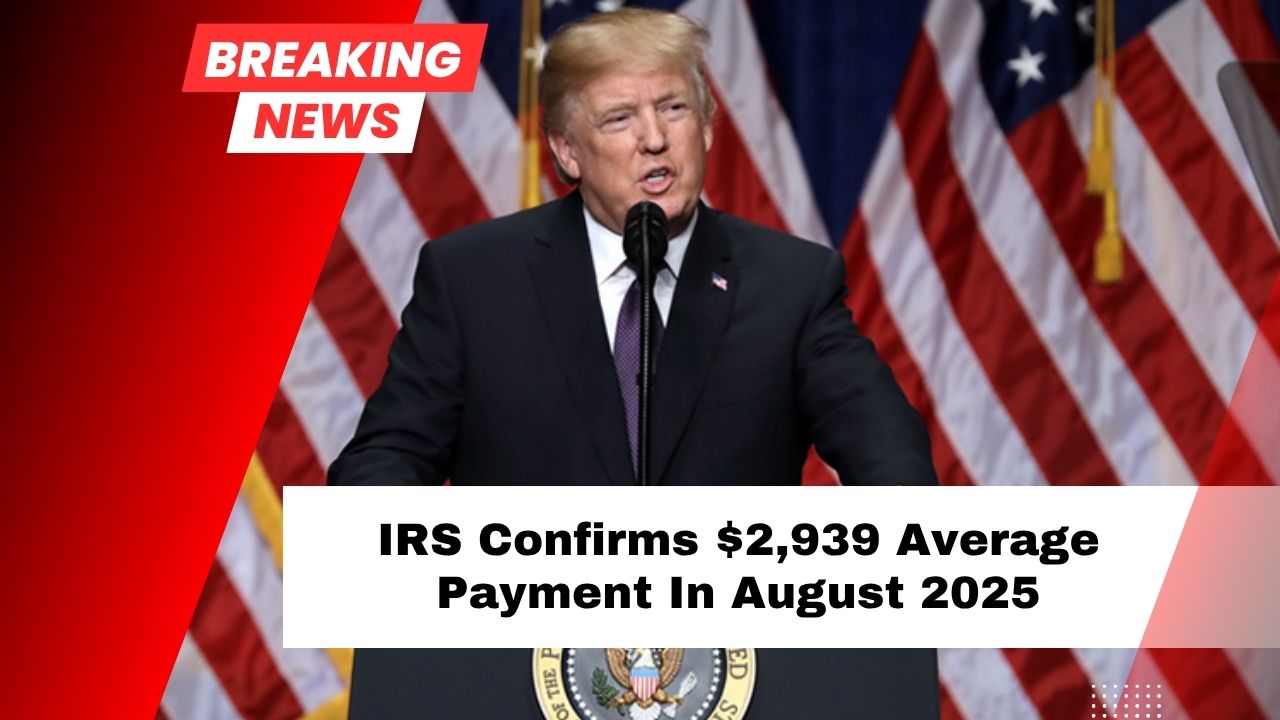Millions of Americans are set to receive a $2,939 IRS payment in August 2025, sparking questions about eligibility, payment timing, and whether action is required.
Contrary to rumors, this is not a new stimulus check, but rather the average federal tax refund many citizens will receive based on their 2024 tax return and ongoing federal benefit disbursements like Social Security, SSI, or SSDI.
Here’s everything you need to know about this highly anticipated payment.
What Is the $2,939 IRS Payment?
The $2,939 payment is the national average refund amount for taxpayers filing 2024 returns. It includes:
- Standard IRS tax refunds
- Payments for beneficiaries receiving Supplemental Security Income (SSI)
- Social Security Disability Insurance (SSDI)
- Social Security retirement benefits
These funds are non-taxable and do not affect eligibility for programs such as SNAP, Medicaid, or housing assistance.
Eligibility Criteria for the $2,939 IRS Payment
To receive the IRS refund or benefit in August 2025, individuals must meet the following conditions:
| Eligibility Requirement | Details |
|---|---|
| Filed 2024 federal tax return | By April 15, or May 31 with extension |
| No active disputes or audit with the IRS | Return must be processed |
| Valid SSN or ITIN | Required for all eligible claimants |
| Receiving federal benefits (SSI, SSDI, Social Security) | Must meet program-specific income criteria |
| Up-to-date banking/personal info with IRS or SSA | Ensures prompt deposit or check delivery |
No separate application is needed if you’ve already submitted a return or are enrolled in benefit programs.
IRS Payment Schedule – August 2025
The IRS processes payments based on return submission date and payment method. Here’s a breakdown:
| Filing Method | Return Accepted | Payment Method | Expected Refund Issuance |
|---|---|---|---|
| E-file (direct deposit) | July 1–20, 2025 | Direct Deposit | July 21–August 1, 2025 |
| E-file (direct deposit) | July 21–26, 2025 | Direct Deposit | August 1, 2025 |
| E-file (direct deposit) | July 27–August 2, 2025 | Direct Deposit | August 8, 2025 |
| Paper return (check) | July 2025 | Paper Check | August 8–15, 2025 |
| Late electronic filing | Early August 2025 | Direct Deposit | August 15–22, 2025 |
Those opting for paper checks may experience a longer processing time—6 to 8 weeks from IRS return acceptance.
How to Claim the $2,939 IRS Payment
- Already filed your 2024 tax return?
You’re all set—no further action is needed. - Receiving Social Security, SSI, or SSDI?
Your details are already with the SSA, and you’ll receive your funds via your usual payment method. - Didn’t file taxes?
Use the IRS Non-Filer Tool to register your eligibility—especially important for low-income individuals not required to file taxes.
Refunds are calculated based on withholdings, credits, and income deductions from your 2024 return.
Is This a Stimulus Check?
No. The $2,939 payment is not a new stimulus initiative. It represents the average refund being issued to eligible taxpayers and is part of the regular IRS refund cycle and federal disbursements.
Still, its arrival in August 2025 comes at a crucial time for many households coping with inflation, economic changes, and rising costs of living.
The $2,939 IRS payment scheduled for August 2025 offers timely relief for millions of Americans.
Whether you’re receiving this amount as part of your tax refund or through federal benefit disbursements, the key is making sure your tax return is complete, and your banking information is up to date.
With no new stimulus expected, this refund represents a crucial financial boost for many households.
Stay informed, track your payment using the IRS “Where’s My Refund” tool, and be prepared for direct deposits or mailed checks in line with your filing method.
FAQs
Is everyone getting $2,939 from the IRS?
No, that’s just the national average. Individual refunds may be higher or lower based on income, deductions, and credits.
Do I need to apply for the payment?
No, if you’ve filed your 2024 tax return or are receiving federal benefits, your payment will be processed automatically.
Is the $2,939 refund taxable?
No, IRS refunds and federal benefit payments are tax-free and won’t affect your eligibility for other federal aid programs.
